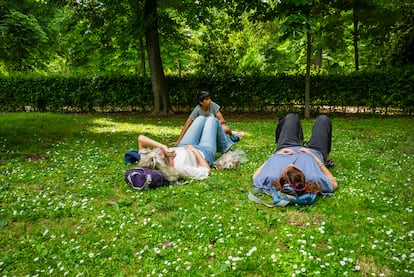Impossible to rest (not even) on vacation
As soon as we approach rest as an objective, we’ve turned it into just another chore and, without realizing it, transformed it into another unattainable goal

All my friends, family, colleagues, and acquaintances shared a common longing for the recent Easter vacation: to get some rest. We all reached our vacation days with a radical need for rest, but when the vacation break was over, we craved time to unwind from the weariness of the holidays. For the vast majority, living has become an exhausting exercise. The fact that this week I want to write about rest is, in reality, a way for me to demand rest within this column as well. To stop thinking about what’s happening in the world, and what I could formulate a more or less interesting or appropriate opinion about. To think about the world also means to rest in it, to look at it slowly, to be speechless, to say nothing. And here I am, silent, relaxed, and with a question to reflect on together: why are so many people so profoundly tired?
I think it’s the pressure we put on each of our actions that tires us out so much. There’s a level of demand on the mental environment of our time that’s impossible to maintain. The variety of tasks we face is ever-increasing, and they’re all equally important. It’s equally important to take the kids to school (and do it well, with love, with joy, with positive education), plan vacations (book early and cheaply, find the best-rated restaurants, buy tickets, take good photos), ace the meeting with your boss, the exam, or the workout, reflect on your sexual health, or arrange a Bumble date. And this mental demand is exhausting, I’d say unbearable. It’s as if we’ve lost the hierarchy of actions and goals and, in the process, what used to be called life priorities. Now, existential priority is everything. So it’s not life that’s tiring, but the way we live it.
And this level of demand sometimes becomes a burden on our heads, tons of obligations that cover us like a mass of paralyzing cement. Everything becomes laborious and demanding, and we lose, in the worst cases, that happy carefree attitude that is essential to face life with a certain lightness and joy. But how does one approach lightness with the weight of the cement with which life has been covered? If you’re going to eat, you first have to prepare the food. If you’re going to prepare the food, you first have to buy it. If you’re going to buy something, you first have to have earned money. If you already have the money, then you must have a profession to have earned that money. Every human act is divided into infinite unfinished and inexhaustible worlds, and we, who know this, exhaust ourselves just thinking about the radical effort with which we want to undertake each of the tasks that, of course, we consider transcendental one by one and each in itself, as much or more than its objective.
And what’s the point of a vacation? To rest, as we’ve already said. But, paradoxically, as soon as we approach rest as a goal, we’ve turned it into just another chore and, without realizing it, transformed it into another unattainable objective. As things stand, all we can do is wish it were Monday again. Maybe then, if we take our routine with the lightness it deserves, we’ll finally get a well-deserved vacation... from ourselves.
Sign up for our weekly newsletter to get more English-language news coverage from EL PAÍS USA Edition
Tu suscripción se está usando en otro dispositivo
¿Quieres añadir otro usuario a tu suscripción?
Si continúas leyendo en este dispositivo, no se podrá leer en el otro.
FlechaTu suscripción se está usando en otro dispositivo y solo puedes acceder a EL PAÍS desde un dispositivo a la vez.
Si quieres compartir tu cuenta, cambia tu suscripción a la modalidad Premium, así podrás añadir otro usuario. Cada uno accederá con su propia cuenta de email, lo que os permitirá personalizar vuestra experiencia en EL PAÍS.
¿Tienes una suscripción de empresa? Accede aquí para contratar más cuentas.
En el caso de no saber quién está usando tu cuenta, te recomendamos cambiar tu contraseña aquí.
Si decides continuar compartiendo tu cuenta, este mensaje se mostrará en tu dispositivo y en el de la otra persona que está usando tu cuenta de forma indefinida, afectando a tu experiencia de lectura. Puedes consultar aquí los términos y condiciones de la suscripción digital.









































